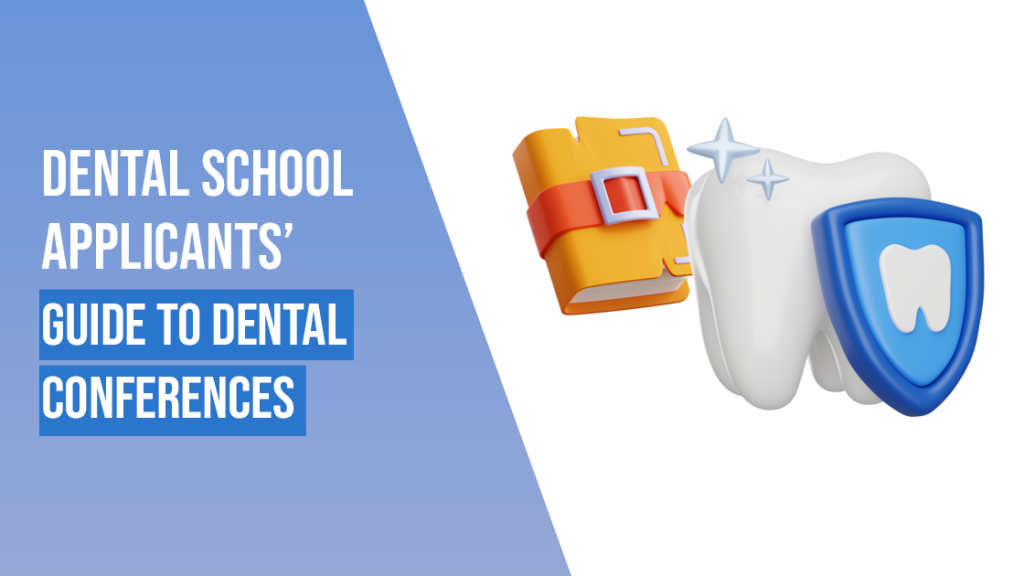Imagine stepping into a dental office for your routine check-up. You’re greeted with a warm smile, and before you know it, you’re comfortably settled in the chair, ready for your appointment. The person who made this seamless experience possible?
A dedicated dental assistant. Dental assistants are the unsung heroes of dental practices, playing a crucial role in ensuring that everything runs smoothly and efficiently.
According to the U.S. Bureau of Labor Statistics (BLS), employment of dental assistants is projected to grow 8% from 2021 to 2031, which is faster than the average growth rate for all occupations. This blog walks you through the various aspects of dental assisting, providing a clear and detailed picture of what it takes to perform this vital role. As someone interested in a career in dental care, you might be curious about what a dental assistant does daily.
What is a Dental Assistant?
A dental assistant is a key player in a dental office. In your role, you’ll ensure that procedures go smoothly. You will help manage instruments, assist with patient care, and keep the office organized. Your efficiency and expertise will significantly contribute to patient satisfaction and the overall workflow of the practice. Understanding these responsibilities can help you better understand the role and prepare for a successful career.
Dental assistants are essential to the dental field for many reasons. They provide direct patient care and support the dentists, from preparing the treatment room and sterilizing instruments to assisting during procedures and managing administrative tasks. Dental assistants are the backbone of any dental practice. Their expertise and attention to detail ensure that patients receive the highest quality of care.
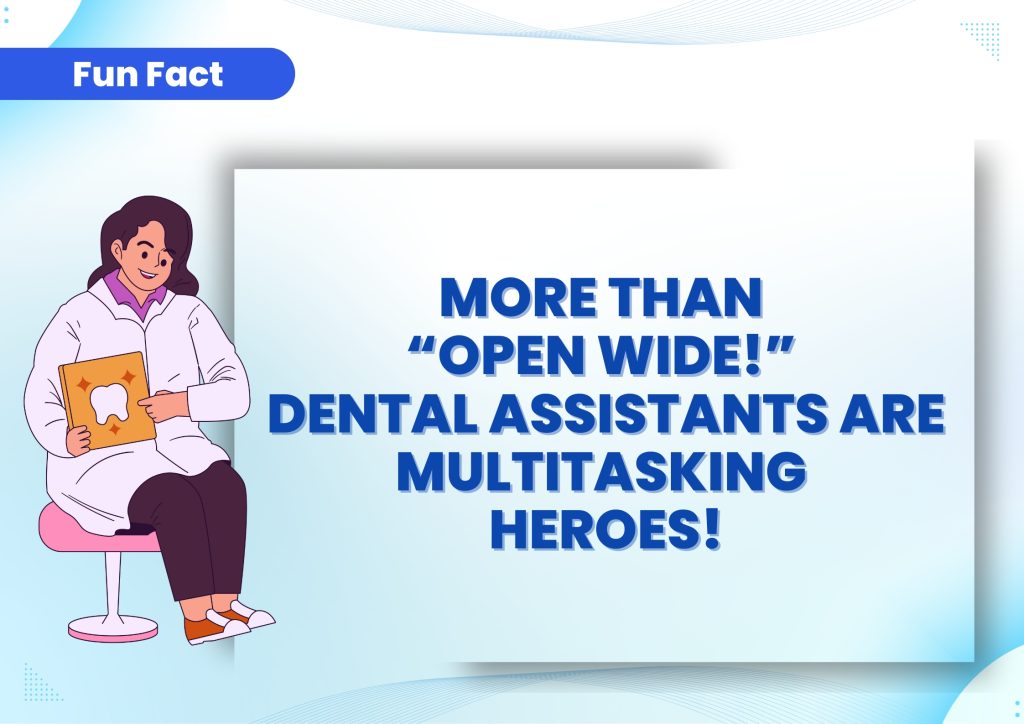
Breakdown of Clinical and Administrative Duties
You might think dental assistants hand over tools and say, “Open wide,” but there’s so much more to their day! Imagine juggling clinical tasks, administrative duties, and even occasionally calming down a nervous patient convinced that flossing is a form of medieval torture.
Dental assistants are the unsung heroes of the dental world, ensuring everything runs like a well-oiled machine. Ready to get a peek into their world? Let’s dive into dental assistants’ fascinating, multitasking, and sometimes hilarious work, where clinical precision meets administrative wizardry!
Clinical Duties
You’ll greet patients, prepare them for treatments, and ensure their comfort.
You’ll be responsible for sterilizing dental tools and setting up procedures.
You’ll assist the dentist during treatments by providing the necessary tools and ensuring the procedure goes smoothly.
Taking and Developing X-rays
Laboratory Tasks: Prepare materials for crowns, bridges, and other dental appliances.
Administrative Duties
Organizing patient schedules and managing appointment bookings are crucial for running the practice efficiently.
You’ll assist with processing payments and managing patient accounts.
Keeping accurate and up-to-date patient records is essential for effective care and compliance with regulations.
Informing patients about their oral health and navigating their insurance benefits are key to patient care.
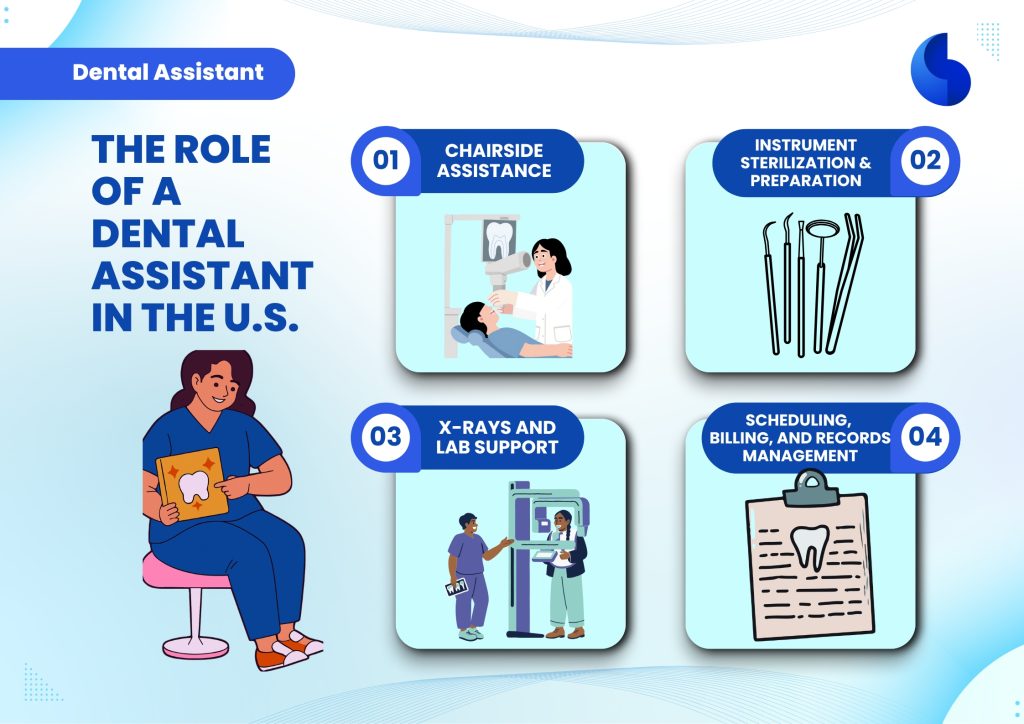
Types of Dental Assistants
Did you know that not all dental assistants do the same job? Dental assistants come in various specializations, from those who ensure the tools are spotless to those who assist with intricate procedures. Let’s explore how each type contributes to your oral healthcare experience.
Overview of Different Categories of Dental Assistants
Type of Dental Assistant | Description |
Entry-Level/Unregistered Dental Assistants |
|
Certified Dental Assistants (CDA) |
|
Registered Dental Assistants (RDA) |
|
Expanded Function Dental Assistants (EFDA) |
|
Certifications and Additional Specializations |
|
Dental Shadowing/Assisting Experience – Why and how? – Dr. Nourah
How to Become a Dental Assistant in the U.S.?
Do you know that over 330,000 dental assistants are employed alone in the United States? According to the U.S. Bureau of Labor Statistics, this number is expected to increase by 7% from 2022 to 2032, faster than the average growth rate for most occupations. This increasing demand underscores the crucial role dental assistants play in dental care.
If you’re considering becoming a dental assistant, here’s what you need to know about the path to this career.
Education and Training Requirements: To get started, you’ll need to complete a formal education program. This can be completed in about a year and lead to a certificate or diploma. If you are seeking more in-depth training, two-year programs are available, culminating in an associate’s degree.
Steps to Becoming a Dental Assistant
The Commission on Dental Accreditation (CODA), part of the American Dental Association, accredits approximately 250 dental assisting training programs. These accredited programs offer a comprehensive curriculum, including classroom and laboratory work.
You learn about teeth, gums, jaws, and other areas relevant to dental care, as well as the instruments used by dentists. Additionally, these programs provide supervised practical experience, ensuring that graduates are well-prepared to enter the workforce with confidence and competence.
-
Enroll in a program accredited by the Commission on Dental Accreditation (CODA).
-
Participate in clinical training included in your program.
-
You might need to pass an exam to become certified, depending on state requirements.
-
Ensure you meet all state-specific licensing or registration requirements if applicable.
Dental Assistant Certification
Certification can be a game-changer for your career as a dental assistant. It demonstrates your skills and can open doors to better job opportunities. It can significantly elevate your career path. While some states don’t require it, becoming certified shows a strong commitment to your profession and sets you apart in a competitive job market.
-
Certification shows that you have the skills and knowledge needed for the job.
-
Certified dental assistants often have better prospects and higher earning potential.
-
Certification can lead to specialized roles and higher-level positions.
Keywords: Dental Assistant Jobs
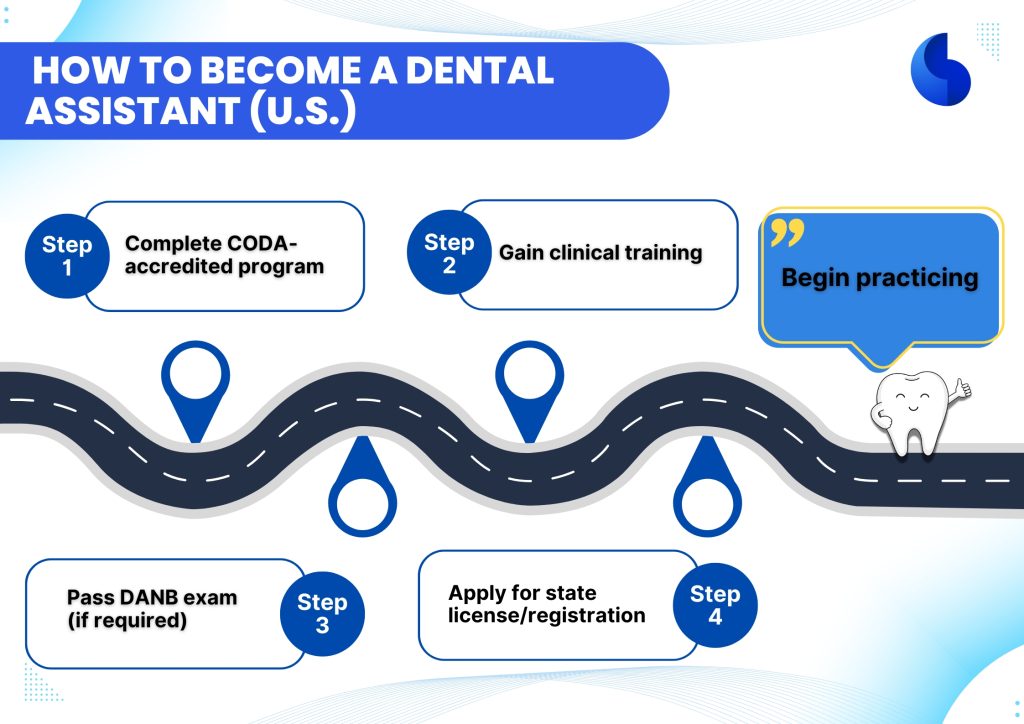
Foreign Dentists and the Meaning of a Dental Assistant’s Job
I recall one of our applicants shared this that she walked into a U.S. dental office for the first time, she was there as a patient—she was simply curious. She wanted to see what dentistry looked like here, how patients were treated, and how the system worked. So, she asked a simple question: “Can I explore the role of a Dental Assistant?” To her surprise, the answer was yes.
That “yes” opened a door that many foreign-trained dentists eventually walk through.
For many internationally trained dentists, stepping into the role of a Dental Assistant (DA) is more than just taking a job—it’s often the first real doorway into understanding how dentistry works in the U.S. healthcare system. While waiting to begin or apply for a DDS program, working as a DA allows foreign dentists to observe, adapt, and learn firsthand what patient care, clinical workflows, and team dynamics look like here.
From the perspective of a prospective DDS applicant, this role becomes a bridge between where you are now and where you want to be. A DA position can:
Provide Exposure – You’re in the operatory, assisting, sterilizing, and charting, but also watching how dentists interact with patients and staff.
Build Confidence – You get familiar with U.S. terminology, materials, and systems, which makes the DDS journey less intimidating.
Strengthen Applications – Real-world U.S. dental experience adds weight to your profile and shows commitment to the profession.
And the opportunities? They’re diverse:
Private Practices – The most common setting, where you assist in day-to-day general dentistry.
Specialty Practices – Orthodontics, periodontics, or oral surgery practices give you exposure to advanced techniques.
Hospitals & Clinics – Larger healthcare environments where teamwork and multitasking shine.
Dental Schools – Academic settings where you might even assist in teaching or research environments.
At the heart of it, being a Dental Assistant isn’t just about chairside help—it’s about laying the foundation for your future career as a dentist in the U.S.. For foreign-trained dentists, it’s both a stepping stone and a learning platform, preparing you with the skills, confidence, and readiness to thrive as a future DDS.
How to make the most out of your dental shadowing/assisting experience? – Dr. Nourah
States in the U.S. with No Licensure Requirements for Dental Assistants
While most states require dental assistants to hold a license or certification, some do not. In states without formal licensure requirements, on-the-job training is a common route. This allows you to gain practical experience while working, often without the added cost of formal education. This training can provide hands-on experience and immediate employment opportunities.
Here’s a look at a few states.
|
State |
Licensure Requirement |
Training/Certification |
|
Hawaii |
No state licensure required |
On-the-job training is common |
|
Minnesota |
No state licensure required for basic practice |
Certification may be needed for specific tasks |
|
Oklahoma |
No state licensure required for basic practice |
On-the-job training is flexible; certification may be required for specific duties |
|
Maryland |
No state licensure required for basic practice |
No state licensure required for basic practice |
|
Missouri |
No state licensure required for basic practice |
No state licensure required for basic practice |
Benefits of DA Networking Opportunities
For those with long-term goals, such as becoming a dentist, working as a dental assistant can also serve as a powerful stepping stone. It’s a great way to gain firsthand clinical experience, build professional relationships, and strengthen your profile for dental school applications.
One of our applicants recalls during a consultation at a dental office,she found herself curious about the role of a Dental Assistant (DA) and how it could open doors to exploring dentistry in the U.S. She struck up a conversation with the dentist, asked about opportunities, and to her delight—was given a chance to step into the DA role.
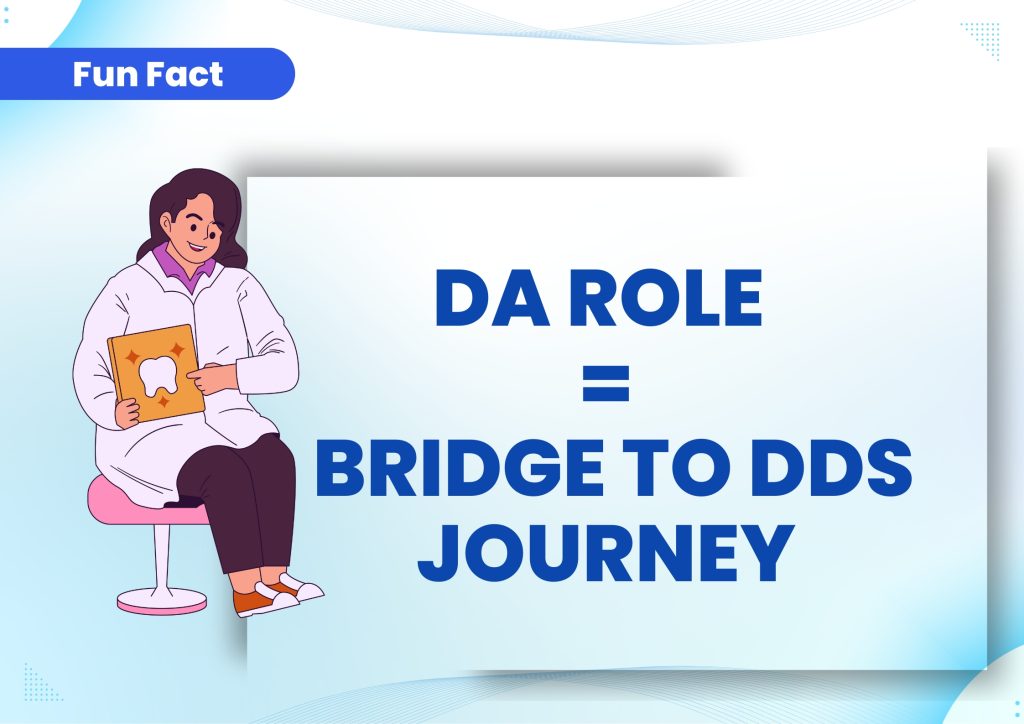
How a DA positions to Building a Profile for DDS (Doctor of Dental Surgery) for Foreign Dentist?
Building a solid profile as a dental assistant can boost your chances of becoming a DDS. Some benefits include gaining hands-on experience, learning from professionals, and taking on responsibilities that enhance your skills. You can also network with dentists and other professionals to gain valuable insights and mentorship.
Stay updated on the latest dental technologies and practices to show your commitment to continuous learning. Remember that every task you master and the certification you earn will strengthen your application and set you apart on your DDS journey.
Conclusion
The role of a dental assistant is vital to the dental healthcare system. It’s a great career choice with diverse job opportunities, competitive salaries, and a positive outlook. If you’re considering this profession, explore training programs and certifications to start your journey.
Ready to dive in? Explore accredited programs and get certified to begin your career as a dental assistant. The future of dental assisting looks promising, and your role in it could have a significant impact on the lives of many patients.



